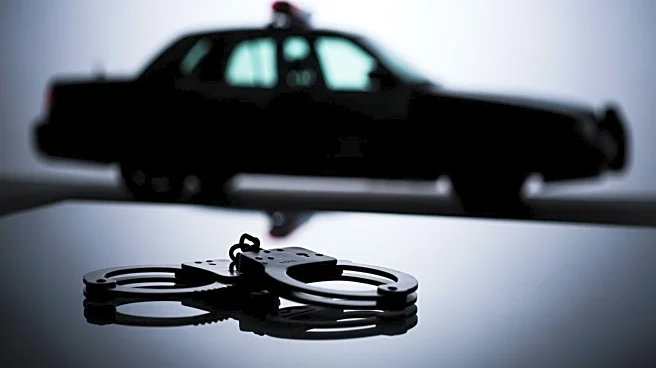What's Happening?
Former Minnesota Vikings running back Adrian Peterson was arrested in Sugar Land, Texas, on charges of driving while intoxicated (DWI) and unlawful carrying of a weapon. The arrest occurred at 9:30 a.m.
on a Sunday, as confirmed by local police and jail records. This marks the second time in 2025 that Peterson has been arrested for a suspected DWI, with a previous incident occurring in Minnesota in April. Peterson, who is 40 years old, had a distinguished NFL career, being drafted by the Vikings in 2007 and earning multiple accolades, including the 2012 NFL MVP award. Despite his on-field success, Peterson has faced several off-the-field issues, including a suspension in 2014 for disciplining his son with a switch and a 2022 arrest for alleged domestic violence.
Why It's Important?
The arrest of Adrian Peterson highlights ongoing challenges faced by former professional athletes in managing life after sports. Peterson's legal troubles could impact his legacy and potential Hall of Fame candidacy, as off-field behavior is often considered in such evaluations. The incident also underscores the broader issue of substance abuse and legal troubles among retired athletes, which can affect their post-career opportunities and public perception. For the NFL, this situation may prompt discussions on the support systems available to players transitioning out of the league, emphasizing the need for comprehensive programs addressing mental health and legal guidance.
What's Next?
Peterson's legal proceedings will likely unfold in the coming months, with potential court appearances and legal negotiations. The outcome of these charges could influence his public image and future endeavors, including potential roles in sports commentary or coaching. The NFL and its associated organizations may also face pressure to enhance support for retired players, focusing on preventing similar incidents. Stakeholders, including former teammates and sports analysts, may weigh in on the implications of Peterson's arrest, potentially influencing public discourse on athlete conduct and rehabilitation.
Beyond the Headlines
This incident may spark broader conversations about the responsibilities of sports organizations in supporting athletes' transitions to post-career life. Ethical considerations regarding the treatment and rehabilitation of athletes with legal issues could lead to policy changes within sports leagues. Additionally, the cultural impact of high-profile athletes facing legal troubles may influence public attitudes towards celebrity accountability and the role of sports figures as role models.










